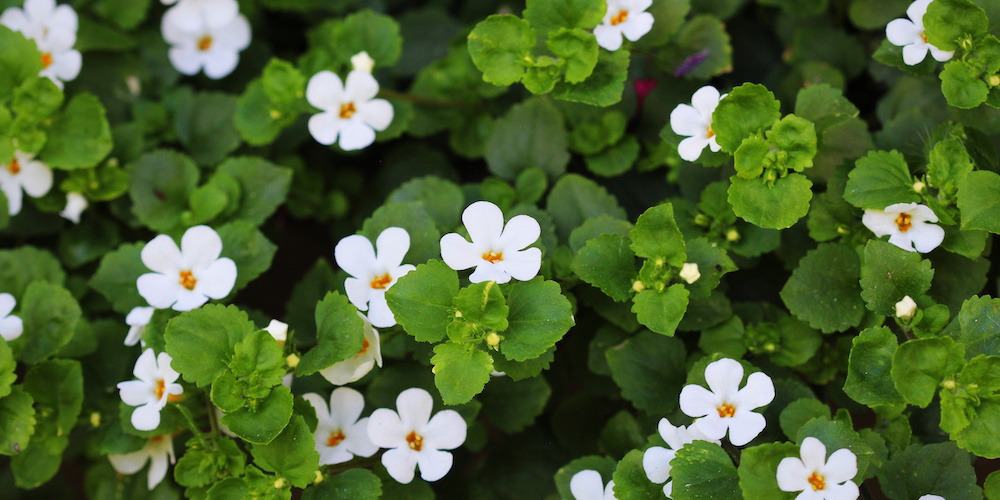BENEFITS OF BACOPA
✓ Enhances memory and cognitive functions
✓ Protects the brain
✓ Relieves inflammation
✓ Reduces stress and anxiety
✓ Improves mood
What is bacopa?
Bacopa, scientifically named Bacopa monnieri, belongs to the Scrophulariaceae family, which includes over 3000 plant species. It is also known as water hyssop or brahmi, a name derived from the Hindu “Brahmā” in reference to the creator god in Hinduism.
Native to India and Southeast Asia, bacopa is a succulent aquatic plant that thrives in tropical and humid areas. It is commonly found in ponds, marshes, bogs, mangroves, and brackish waters. It also grows in rice paddies where it is considered a weed.
Bacopa is a perennial plant with a trailing or creeping habit. It is about 30 cm tall and 50 cm in diameter. The plant has thick, rounded green leaves and features small white flowers from May to October.
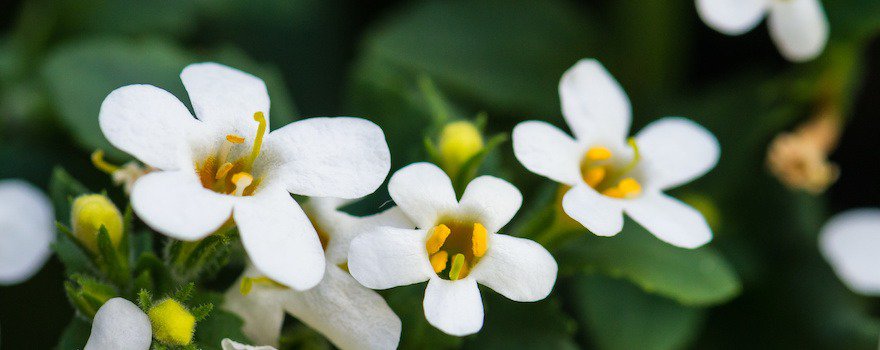
In Europe, Bacopa monnieri is offered as a decorative plant for hanging, pot, or pond edge cultivation. Its attractive evergreen leaves and ability to remain submerged make it suitable for aquariums as well. But bacopa has more to offer…
For nearly 3000 years, the plant has been used in Ayurvedic medicine to alleviate various conditions, both physical and mental: back pain, joint pain, epilepsy, stress and anxiety, mood disorders… However, bacopa is mainly known as a nerve tonic and memory enhancer. It calms and rebalances the 3 doshas: Vâta, Pitta, and Kapha.
In Ayurveda, it belongs to the “medhya rasayanas” plants, like ashwagandha (Withania somnifera), which enhance cognitive functions.
The leaves and stems of bacopa are the parts richest in active compounds. Traditionally, they were pressed to obtain a concentrated plant juice. They could also be dried and reduced to powder. Today, it is available as a dietary supplement in capsules, powder, or mother tincture.
Various research on bacopa has highlighted numerous properties. The plant is primarily recommended for stimulating memory and cognitive functions, protecting the nervous system, reducing stress and anxiety, relieving inflammation, and improving mood.
It is part of what is now called nootropics, natural compounds specializing in mental well-being and cognitive abilities.
Nutritional Composition
- Amino acids
- Vitamin C
- Minerals and trace elements: calcium, phosphorus, iron…
- Triterpenoid saponins: bacosides A and B, bacosaponins
- Flavonoids: luteolin, apigenin, quercetin
- Organic compounds: jujubogenin, cucurbitacins, coumarins
- Alkaloids
- Phytosterols: stigmastanol
- Fibers
- Proteins
- Lipids
- Carbohydrates
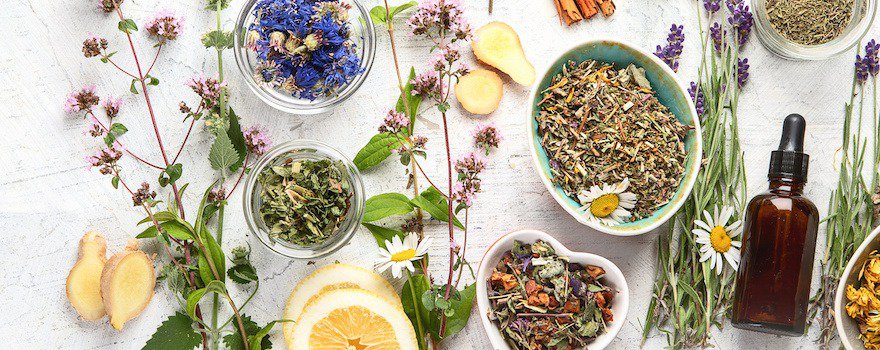
The Benefits of Bacopa
👩🏫 Enhances memory and cognitive functions
Many studies demonstrate the effectiveness of bacopa in enhancing memory and cognitive abilities such as attention, reasoning, learning, and information processing speed.
This action is largely due to bacosides A and B, the main active substances of bacopa. They notably affect long-term memory and the hippocampus, a brain area that plays a central role in the memory process.
Bacosides also increase levels of acetylcholine, a neurotransmitter involved in memory and learning. This plant is currently being studied as a potential agent to improve symptoms of Alzheimer’s disease.
This study by the School of Biophysical Science and Electrical Engineering in Victoria, Australia, conducted on adults, shows that bacopa improves the speed of visual information processing, learning, and memory.
This other study from the University of Wollongong in Australia, conducted on adults aged 40 to 65, also shows the effects of bacopa on human memory.
🧠 Protects the brain
The bacosides A and B in bacopa also have neuroprotective effects due to their free radical scavenging activity. They are powerful antioxidant molecules that protect neurons from oxidative damage.
Bacopa is particularly effective in the prefrontal cortex, the seat of various higher cognitive functions (working memory, reasoning…), the hippocampus, and the striatum. This brain region is notably involved in movement, pain management, and brain tissue regeneration.
Due to its antioxidant action, this plant is interesting for fighting oxidative stress, which plays a role in the onset of neurodegenerative diseases such as Alzheimer’s or Parkinson’s. The vitamin C contained in bacopa also helps to limit oxidative stress.
This study from Jawaharlal Nehru University in New Delhi, India, conducted on rats, shows how bacopa protects the hippocampus region from oxidative stress.
This other study from Banaras Hindu University in India, also conducted on rats, also demonstrates the antioxidant activity of bacopa on different brain regions.
🌵 Relieves Inflammation
Bacopa is also a potent natural anti-inflammatory. Flavonoids, alkaloids, vitamin C, and bacosides all contribute to reducing inflammation by inhibiting the production of pro-inflammatory cytokines.
These small proteins, most notably TNF-alpha (Tumor Necrosis Factor alpha) and IL-6 (Interleukin-6), activate the body’s inflammatory response. They are particularly involved in joint diseases related to inflammation such as arthritis, osteoarthritis, and rheumatoid arthritis. This is why anti-TNF-alpha and anti-IL-6 medications are often the main treatments for rheumatism and chronic inflammatory diseases.
Bacopa also seems to inhibit the action of certain enzymes involved in the inflammatory process, such as caspase 1 and 3, which play a role in cytokine activation and are pro-inflammatory.
This 2017 study from the University of Montana in the United States, conducted directly on cell lines, shows how bacopa inhibits the release of inflammatory cytokines in the brain.
In this other study from the Medical College in Jodhpur (India), conducted on rodents, the anti-inflammatory activity of an Ayurvedic preparation based on bacopa (Brahmi Rasayan) was found to be comparable to that of indomethacin (a non-steroidal anti-inflammatory drug).
🧘🏻♀️ Reduces Stress and Anxiety
Bacopa is part of the adaptogenic plants like ginseng (Panax ginseng), maca (Lepidium meyenii), or rhodiola (Rhodiola rosea). It is thus capable of improving the body’s resistance to situations of physical, psychological, acute, or chronic stress.
Simultaneously, it has a calming and anxiolytic action that promotes calmness and relaxation. It is therefore particularly suitable for stress, anxiety, depression, overwork, and mental fatigue.
It acts notably by reducing cortisol levels, the stress hormone, and by supporting the activity of neurotransmitters such as serotonin, GABA (γ-aminobutyric acid), and acetylcholine.
This study from the Central Drug Research Institute in Lucknow, India, conducted on rats, shows the adaptogenic effect of bacopa.
This other study from Banaras Hindu University in India, also conducted on rats, confirms the anxiolytic activity of bacopa.
🤩 Improves Mood
Bacopa is a very interesting plant for relieving mood disorders: irritability, impulsiveness, attention deficit hyperactivity disorder (ADHD)… To achieve this, it acts mainly on the prefrontal cortex, a brain area associated with behavior, expression, and emotion management.
Its components increase the levels of serotonin and dopamine, hormones that provide mood stability. The plant’s anti-stress and calming action also contributes to emotional control and mental well-being.
This study, conducted by Indian researchers on children with ADHD, demonstrates the effectiveness of bacopa in improving their symptoms (attention deficit, learning problems, impulsivity…).

How to consume bacopa?
Bacopa in tablets
Bacopa tablets or capsules generally contain leaf powder, the part of the plant richest in bacosides. The stem may also be included in the composition, although it is poorer in active ingredients.
This form can be found easily in organic and specialized stores or online. Preferably choose 100% natural and/or certified organic capsules, non-GMO, without excipients and non-irradiated. They must also be sufficiently rich in bacosides (at least 50%) to fully benefit from its effects on the body.
Bacopa in powder form
Bacopa powder is obtained after drying and grinding the leaves and/or stems of the plant. It is a dietary supplement rich in active ingredients that mixes easily with water, fruit juice, or any other beverage.
However, bacopa has the disadvantage of having a very bitter taste that may not appeal to everyone. It is possible to mix the powder with applesauce to mask this unpleasant taste.
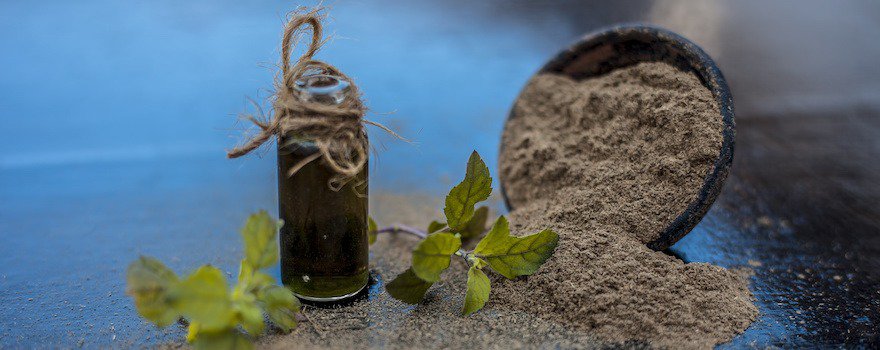
Bacopa in mother tincture
The mother tincture of bacopa is obtained by hydroalcoholic extraction of the entire plant. It dilutes easily in water or fruit juice.
While rich in active ingredients, this format has the disadvantage of containing a lot of alcohol (about 60%). It is therefore not recommended for pregnant women, children, or people suffering from certain conditions.
If you choose the mother tincture, preferably select bacopa grown in India according to organic farming principles and whose traceability is guaranteed.
Bacopa and medicinal plants
To improve physical and mental well-being, bacopa pairs well with ginseng, which promotes nervous system balance, and rhodiola, which enhances cognitive functions.
The bacopa/ginkgo biloba combination is also interesting for boosting memory and reducing anxiety. In Ayurvedic medicine, bacopa is often combined with Centella asiatica or “Tiger Herb,” a nerve cell regenerating plant that improves concentration and memory.
Meanwhile, it is recommended to consume foods rich in magnesium, B vitamins, and omega-3s to amplify the effects of our plant.
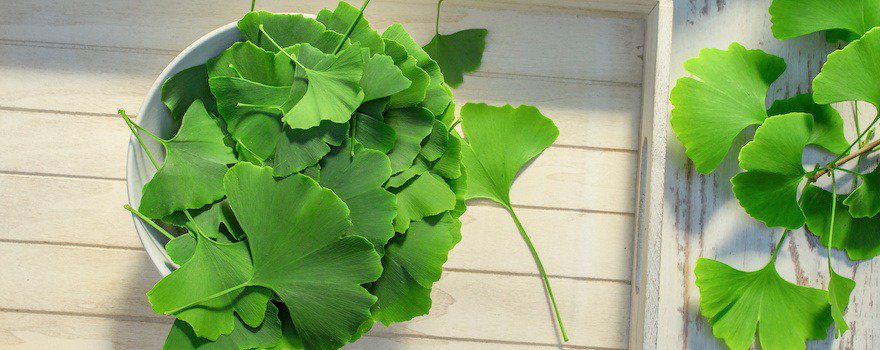
Bacopa dosage
⚖️ The recommended dosage varies between 300 and 450 mg of bacopa per day.
⏳ Intakes should be spread over several times (1 to 3 times) and with meals as the plant can have side effects when consumed on an empty stomach.
⏳ The first results are felt in the long term and usually appear after 3 to 4 weeks. This is why it is recommended to take bacopa in courses of 2 to 4 months, each spaced 4 weeks apart.
💊 In tablet form: up to 2 per day for 300 mg capsules.
🥄 In powder form: up to 5 g per day.
🧪 In mother tincture: 25 drops, 3 times a day.
Contraindications and side effects
Bacopa has certain contraindications and its consumption is not recommended for the following people:
- As a precaution, young children, pregnant or breastfeeding women should avoid taking it.
- It can interact with certain medications. Thus, it is not recommended for people on neuroleptic treatment (phenothiazines), antidepressants (amitriptyline), sedatives, or taking medications for thyroid disorders.
Bacopa has few side effects. However, the following undesirable effects may occur (especially when taken on an empty stomach):
- Nausea.
- Stomach aches and cramps.
- Diarrhea.
- Dry mouth.
- Fatigue.
If you experience side effects, stop your consumption and consult a doctor.
History, Culture, and Market of Bacopa
A plant known since the 6th century
According to this neuropharmacological review from Pitzer College in California, bacopa was first described around the 6th century AD. Mentions of the plant can be found in ancient Ayurvedic texts such as the “Charaka Samhita “, considered one of the foundational texts of Ayurveda, the ” Atharva-Veda “, and the ” Susrutu Samhita “.
In India, the leaves and stems of bacopa are consumed in decoctions or used to make sweet drinks and syrups.
A Culture in Danger
The cultivation of bacopa is very popular in India but also extends to Nepal, China, Sri Lanka, Taiwan, and Vietnam. The plant is propagated by sowing or cuttings. 4 to 5 months later, it is harvested by hand before being sun-dried and ground into powder.
Unfortunately, due to increasing demand and the disappearance of wetlands, bacopa is now threatened. According to this study from the Jawaharlal Nehru Agricultural University in Jabalpur, India, the annual demand for bacopa was already about 1000 tons in 2000.
To find an alternative and prevent its depletion in its natural habitat, researchers have shown that bacopa can also be cultivated in vitro.
Compiled by Julia Perez and Charlotte Jean
Sources and Scientific Studies
Stough C, Lloyd J, Clarke J, Downey LA, Hutchison CW, Rodgers T, Nathan PJ, 2001. The chronic effects of an extract of Bacopa monniera (Brahmi) on cognitive function in healthy human subjects.
Roodenrys S, Booth D, Bulzomi S, Phipps A, Micallef C, Smoker J, 2002. Chronic effects of Brahmi (Bacopa monnieri) on human memory.
Reena Kulkarni, K. J. Girish, and Abhimanyu Kumar, 2012. Nootropic herbs (Medhya Rasayana) in Ayurveda: An update.
AmarJyoti, DeepakSharma, 2004. Neuroprotective role of Bacopa monniera extract against aluminium-induced oxidative stress in the hippocampus of rat brain.
Bhattacharya SK, Bhattacharya A, Kumar A, Ghosal S, 2000. Antioxidant activity of Bacopa monniera in rat frontal cortex, striatum and hippocampus.
Nemetchek MD, Stierle AA, Stierle DB, Lurie DI, 2017. The Ayurvedic plant Bacopa monnieri inhibits inflammatory pathways in the brain.
Rai D, Bhatia G, Palit G, Pal R, Singh S, Singh HK, 2003. Adaptogenic effect of Bacopa monniera (Brahmi).
Bhattacharya SK, Ghosal S, 1998. Anxiolytic activity of a standardized extract of Bacopa monniera: an experimental study.
Dave UP, Dingankar SR, Saxena VS, Joseph JA, Bethapudi B, Agarwal A, Kudiganti V, 2014. An open-label study to elucidate the effects of standardized Bacopa monnieri extract in the management of symptoms of attention-deficit hyperactivity disorder in children.
Sebastian Aguiarcorresponding author and Thomas Borowski, 2013. Neuropharmacological Review of the Nootropic Herb Bacopa monnieri.
Niraj Tripathi, Devendra Singh Chouhan, Navinder Saini, and Sharad Tiwari, 2012. Assessment of genetic variations among highly endangered medicinal plant Bacopa monnieri (L.) from Central India using RAPD and ISSR analysis.
P. Pandiyan, T. Selvaraj, 2012. In vitro multiplication of Bacopa monnieri (L.) Pennell from shoot tip and nodal explants.


